The Complete Dramatic Works (50 page)
Read The Complete Dramatic Works Online
Authors: Samuel Beckett

END
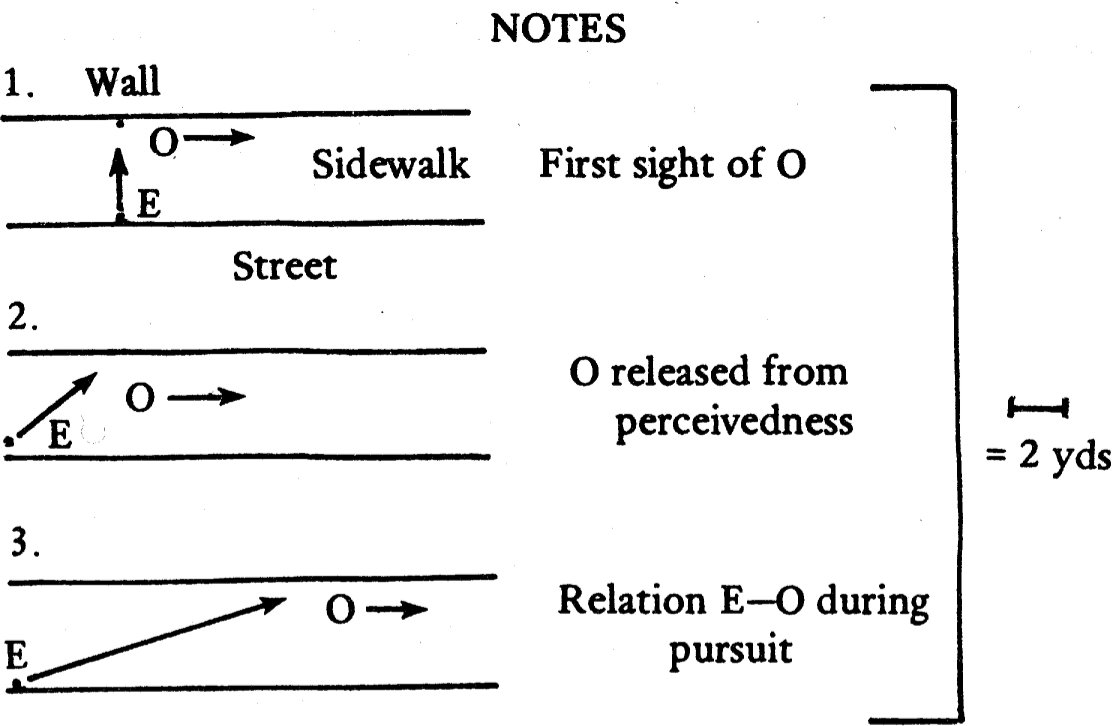
4. The purpose of this episode, undefendable except as a
dramatic
convenience, is to suggest as soon as possible unbearable quality of E’s scrutiny.
Reinforced by episode of flower-woman in stairs sequence.

6. Expression of this episode, like that of animals’ ejection in part three, should
be as precisely stylized as possible. The
purpose
of the monkey, either unaware of E or indifferent to him, is to anticipate behaviour
of animals in part three, attentive to O exclusively.
7. Suggestion for vestibule with (1) O in
percipi
(2) released (3) hiding from flower-woman. Note that even when E exceeds angle of
immunity O’s face never really seen because of immediate turn aside and (here) hand
to shield face.

8. Up till now the perceptions of O, hastening
blindly
to illusory sanctuary, have been neglected and must in fact have been negligible.
But in the room, until he falls asleep and the investment begins, they must be recorded.
And at the same time E’s perceiving of O must continue to be given. E is
concerned
only with O, not with the room, or only incidentally with the room in so far as its
elements happen to enter the field of his gaze fastened on O. We see O in the room
thanks to E’s perceiving and the room itself thanks to O’s perceiving. In other words
this room sequence, up to the moment of O’s falling asleep, is composed of two independent
sets of images. I feel that any attempt to express them in simultaneity (
composite
images, double frame, superimposition, etc.) must prove unsatisfactory. The presentation
in a single image of O’s perception of the print, for example, and E’s perception
of O perceiving it–no doubt feasible technically–would perhaps

make impossible for the spectator a clear apprehension of either. The solution might
be in a succession of images of different
quality,
corresponding on the one hand to E’s perception of O and on the other to O’s perception
of the room. This difference of quality might perhaps be sought in different degrees
of development, the passage from the one to the other being from greater to lesser
and lesser to greater definition or luminosity. The dissimilarity, however obtained,
would have to be flagrant. Having been up-till now exclusively in the E quality, we
would suddenly pass, with O’s first survey of the room, into this quite different
O quality. Then back to the E quality when O is shown moving to the window. And so
on throughout the sequence, switching from the one to the other as required. Were
this the solution adopted it might be desirable to establish, by means of brief sequences,
the O quality in parts one and two.
This seems to be the chief problem of the film, though I perhaps exaggerate its difficulty
through technical ignorance.
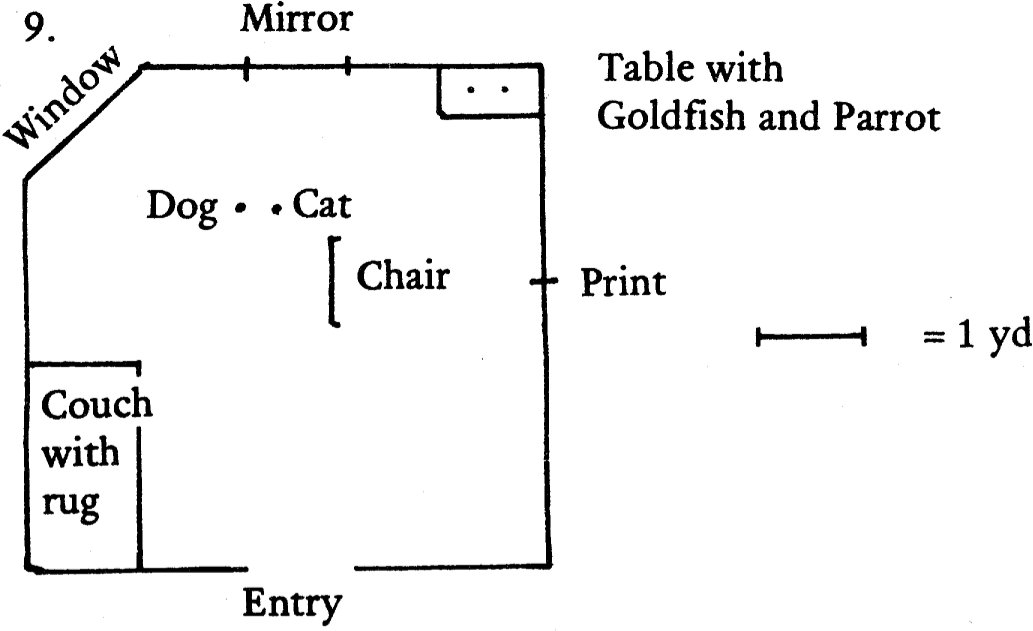
Suggestion for room.
This obviously cannot be O’s room. It may be supposed it is his mother’s room, which
he has not visited for many years and is now to occupy momentarily, to look after
the pets, until she comes out of hospital. This has no bearing on the film and need
not be elucidated.
10. At close of film face E and face O can only be distinguished (1) By different
expressions (2) by fact of O looking up and E down and (3) by difference of ground
(for O headrest of chair, for E wall). Hence insistence on headrest and tattered wall.
11. Foolish suggestion for eviction of cat and dog. Also see Note 6.
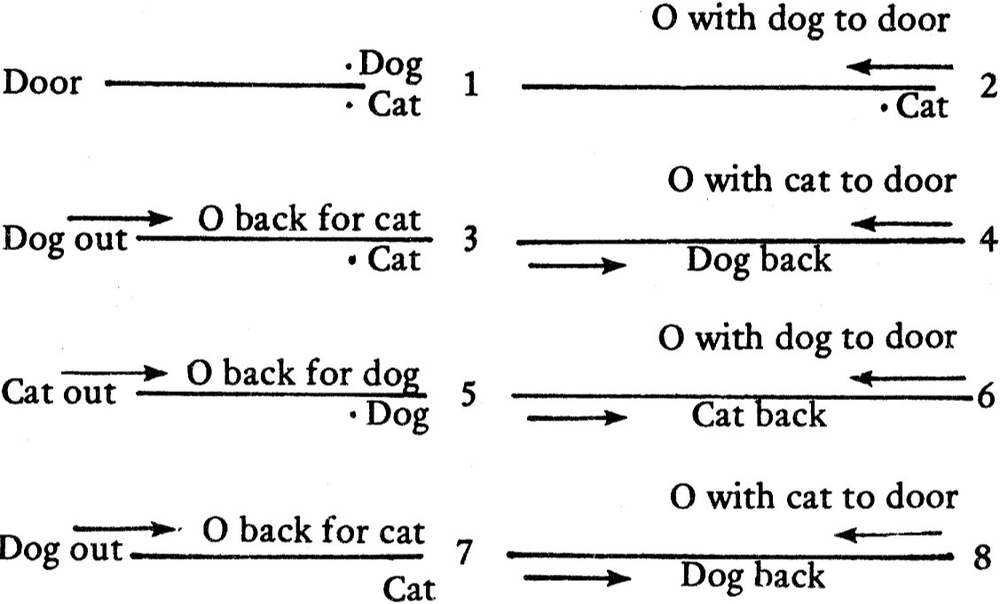
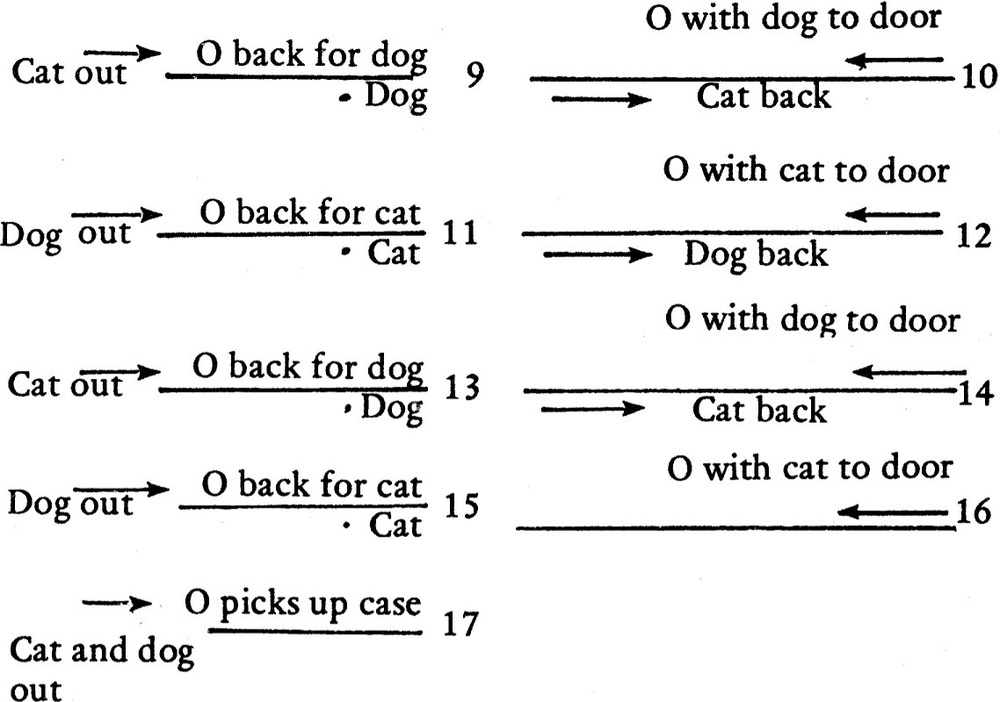
12. Chair from front during photo sequence.
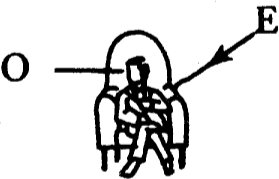
13. Description of photographs.
1. Male infant. 6 months. His mother holds him in her arms. Infant smiles front. Mother’s
big hands. Her severe eyes devouring, him. Her big old-fashioned beflowered hat.
2. The same. 4 years. On a veranda, dressed in loose
nightshirt
, kneeling on a cushion, attitude of prayer, hands clasped, head bowed, eyes closed.
Half profile. Mother on chair beside him, big hands on knees, head bowed towards him,
severe eyes, similar hat to 1.
3. The same. 15 years. Bareheaded. School blazer. Smiling. Teaching a dog to beg.
Dog on its hind legs looking up at him.
4. The same. 20 years. Graduation day. Academic gown.
Mortar-board under arm. On a platform, receiving scroll from Rector. Smiling. Section
of public watching.
5. The same. 21 years. Bareheaded. Smiling. Small moustache. Arm round fiancée. A
young man takes a snap of them.
6. The same. 25 years. Newly enlisted. Bareheaded. Uniform. Bigger moustache. Smiling.
Holding a little girl in his arms. She looks into his face, exploring it with finger.
7. The same. 30 years. Looking over 40. Wearing hat and overcoat. Patch over left
eye. Cleanshaven. Grim expression. 14. Profit by rocking-chair to emotionalize inspection,
e.g. gentle steady rock for 1 to 4, rock stilled (foot to ground) after two seconds
of 5, rock resumed between 5 and 6, rock stilled after two seconds of 6, rock resumed
after 6 and for 7 as for 1–4.
An adaptation
An English adaptation of
La Manivelle
, a play for radio by Robert Pinget, which was first published in France by Editions
de Minuit, Paris, and by John Calder (Publishers), London, in 1963.
Background
of
street
noises.
In
the
foreground
a
barrel-organ
playing
an
old
tune.
20
seconds.
The
mechanism
jams.
Thumps
on
the
box
to
set
it
off
again.
No
result.
GORMAN:
[
Old
man’s
cracked
voice,
frequent
pauses
for
breath
even
in
the
middle
of
a
word,
speech
indistinct
for
want
of
front
teeth,
whistling
sibilants.
] There we go, bust again. [
Sound
of
lid
raised.
Scraping
inside
box.
]
Cursed bloody music! [
Scraping.
Creaking
of
handle.
Thumps
on
box.
The
mechanism
starts
off
again.
] Ah about time!
[
Tune
resumes.
10
seconds.
Sound
of
faltering
steps
approaching.
]
CREAM:
[
Old
man’s
cracked
voice,
stumbling
speech,
pauses
in
the
middle
of
sentences,
whistling
sibilants
due
to
ill-
fitting
denture.
]–Well, if it isn’t–[
The
tune
stops.
] –Gorman my old friend Gorman, do you recognize me Cream father of the judge, Cream
you remember Cream.
GORMAN:
Mr Cream! Well, I’ll be! Mr Cream! [
Pause.
]
Sit you down, sit you down, here, there. [
Pause.
] Great weather for the time of day Mr Cream, eh.
CREAM:
My old friend Gorman, it’s a sight to see you again after all these years, all these
years.
GORMAN:
Yes indeed, Mr Cream, yes indeed, that’s the way it is. [
Pause.
]
And you, tell me.
CREAM:
I was living with my daughter and she died, then I came here to live with the other.
GORMAN:
Miss Miss what?
CREAM:
Bertha. You know she got married, yes, Moody the nurseryman, two children.
GORMAN:
Grand match, Mr Cream, grand match, more power to you. But tell me then the poor
soul she was taken then was she.
CREAM:
Malignant, tried everything, lingered three years, that’s
how it goes, the young pop off and the old hang on.
GORMAN:
Ah dear oh dear Mr Cream, dear oh dear.
[
Pause.
]
CREAM:
And you your wife?
GORMAN:
Still in it, still in it, but for how long.
CREAM:
Poor Daisy yes.
GORMAN:
Had she children?
CREAM:
Three, three children, Johnny, the eldest, then Ronnie, then a baby girl, Queenie,
my favourite, Queenie, a baby girl.
GORMAN:
Darling name.
CREAM:
She’s so quick for her years you wouldn’t believe it, do you know what she came out
with to me the other day ah only the other day poor Daisy.
GORMAN:
And your son-in-law?
CREAM:
Eh?
GORMAN:
Ah dear oh dear, Mr Cream, dear oh dear. [
Pause.
] Ah yes children that’s the way it is. [
Roar
of
motor
engine.
] They’d tear you to flitters with their flaming machines.
CREAM:
Shocking crossing, sudden death.
GORMAN:
As soon as look at you, tear you to flitters.
CREAM:
Ah in our time Gorman this was the outskirts, you remember, peace and quiet.
GORMAN:
Do I remember, fields it was, fields, bluebells, over there, on the bank, bluebells.
When you think …. [
Suddenly
complete
silence.
10
seconds.
The
tune
resumes,
falters,
stops.
Silence.
The
street
noises
resume.
] Ah the horses, the carriages, and the barouches, ah the barouches, all that’s the
dim distant past, Mr Cream.
CREAM:
And the broughams, remember the broughams, there was style for you, the broughams.
[
Pause.
]
GORMAN:
The first car I remember I saw it here, here, on the corner, a Pic-Pic she was.
CREAM:
Not a Pic-Pic, Gorman, not a Pic-Pic, a Dee Dyan Button.
GORMAN:
A Pic-Pic, a Pic-Pic, don’t I remember it well, just as I was coming out of Swan’s
the bookseller’s beyond there on the corner, Swan’s the bookseller’s that was, just
as I
was coming out with a rise of fourpence ah there wasn’t much money in it in those
days.
CREAM:
A Dee Dyan, a Dee Dyan.
GORMAN:
You had to work for your living in those days, it wasn’t at six you knocked off,
nor at seven neither, eight it was, eight o’clock, yes by God. [
Pause.
]
Where was I? [
Pause.
]
Ah yes eight o’clock as I was coming out of Swan’s there was the crowd gathered and
the car wheeling round the bend.
CREAM:
A Dee Dyan Gorman, a Dee Dyan, I can remember the man himself from Wougham he was
the vintner what’s this his name was.
GORMAN:
Bush, Seymour Bush.
CREAM:
Bush that’s the man.
GORMAN:
One way or t’other, Mr Cream, one way or t’other no matter it wasn’t the likes of
nowadays, their flaming machines they’d tear you to shreds.
CREAM:
My dear Gorman do you know what it is I’m going to tell you, all this speed do you
know what it is has the whole place ruinated, no living with it any more, the whole
place ruinated, even the weather. [
Roar
of
engine.
]
Ah when you think of the springs in our time remember the springs we had, the heat
there was in them, and the summers remember the summers would destroy you with the
heat.
GORMAN:
Do I remember, there was one year back there seems like yesterday must have been
round 95 when we were still out at Cruddy, didn’t we water the roof of the house every
evening with the rubber jet to have a bit of cool in the night, yes summer 95.
CREAM:
That would surprise me Gorman, remember in those days the rubber hose was a great
luxury a great luxury, wasn’t till after the war the rubber hose.
GORMAN:
You may be right.
CREAM:
No may be about it. I tell you the first we ever had round here was in Drummond’s
place, old Da Drummond, that was after the war 1920 maybe, still very exorbitant it
was at the time, don’t you remember watering out of the can you must with that bit
of garden you had didn’t you,
wasn’t it your father owned that patch out on the Marston Road.
GORMAN:
The Sheen Road Mr Cream but true for you the watering you’re right there, me and
me hose how are you when we had no running water at the time or had we.
CREAM:
The Sheen Road, that’s the one out beyond Shackleton’s sawpit.
GORMAN:
We didn’t get it in till 1925 now it comes back to me the wash-hand basin and jug.
[
Roar
of
engine.
]
CREAM:
The Sheen Road you saw what they’ve done to that I was out on it yesterday with the
son-in-law, you saw what they’ve done our little gardens and the grand sloe hedges.
GORMAN:
Yes all those gazebos springing up like thistles there’s trash for you if you like,
collapse if you look at them am I right.
CREAM:
Collapse is the word, when you think of the good stone made the cathedrals nothing
to come up to it.
GORMAN:
And on top of all no foundations, no cellars, no nothing, how are you going to live
without cellars I ask you, on piles if you don’t mind, piles, like in the lake age,
there’s progress for you.
CREAM:
Ah Gorman you haven’t changed a hair, just the same old wag he always was. Getting
on for seventy-five is it?
GORMAN:
Seventy-three, seventy-three, soon due for the knock.
CREAM:
Now Gorman none of that, none of that, and me turning seventy-six, you’re a young
man Gorman.
GORMAN:
Ah Mr Cream, always a great one for a crack.
CREAM:
Here Gorman while we’re at it have a fag, here. [
Pause.
]
The daughter must have whipped them again, doesn’t want me to be smoking, mind her
own damn business. [
Pause.
]
Ah I have them, here, have one.
GORMAN:
I wouldn’t leave you short.
CREAM:
Short for God’s sake, here, have one.
[
Pause.
]
GORMAN:
They’re packed so tight they won’t come out.
CREAM:
Take hold of the packet. [
Pause.
]
Ah what ails me all bloody thumbs. Can you pick it up.
[
Pause.
]
GORMAN:
Here we are. [
Pause.
]
Ah yes a nice puff now and again but it’s not what it was their gaspers now not worth
a fiddler’s, remember in the forces the shag remember the black shag that was tobacco
for you.
CREAM:
Ah the black shag my dear Gorman the black shag, fit for royalty the black shag fit
for royalty. [
Pause.
]
Have you a light on you.
GORMAN:
Well then I haven’t, the wife doesn’t like me to be smoking.
[
Pause.
]
CREAM:
Must have whipped my lighter too the bitch, my old tinder jizzer.
GORMAN:
Well no matter I’ll keep it and have a draw later on.
CREAM:
The bitch sure as a gun she must have whipped it too that’s going beyond the beyonds,
beyond the beyonds, nothing you can call your own. [
Pause.
]
Perhaps we might ask this gentleman. [
Footsteps
approach.
]
Beg your pardon Sir trouble you for a light.
[
Footsteps
recede.
]
GORMAN:
Ah the young nowadays Mr Cream very wrapped up they are the young nowadays, no thought
for the old. When you think, when you think …. [
Suddenly
complete
silence.
10
seconds.
The
tune
resumes,
falters,
stops.
Silence.
The
street
noises
resume.
]
Where were we? [
Pause.
]
Ah yes the forces, you went in in 1900, 1900, 1902, am I right?
CREAM:
1903, 1903, and you 1906 was it?
GORMAN:
1906 yes at Chatham.
CREAM:
The Gunners?
GORMAN:
The Foot, the Foot.
CREAM:
But the Foot wasn’t Chatham don’t you remember, there it was the Gunners, you must
have been at Caterham, Caterham, the Foot.
GORMAN:
Chatham I tell you, isn’t it like yesterday, Morrison’s pub on the corner.
CREAM:
Harrison’s. Harrison’s Oak Lounge, do you think I don’t know Chatham. I used to go
there on holiday with Mrs Cream, I know Chatham backwards Gorman, inside and out,
Harrison’s Oak Lounge on the corner of what was
the name of the street, on a rise it was, it’ll come back to me, do you think I don’t
know Harrison’s Oak Lounge there on the corner of dammit I’ll forget my own name next
and the square it’ll come back to me.
GORMAN:
Morrison or Harrison we were at Chatham.
CREAM:
That would surprise me greatly, the Gunners were Chatham do you not remember that?
GORMAN:
I was in the Foot, at Chatham, in the Foot.
CREAM:
The Foot, that’s right the Foot at Chatham.
GORMAN:
That’s what I’m telling you, Chatham the Foot.
CREAM:
That would surprise me greatly, you must have it mucked up with the war, the mobilization.
GORMAN:
The mobilization have a heart it’s as clear in my mind as yesterday the mobilization,
we were shifted straight away to Chesham, was it, no, Chester, that’s the place, Chester,
there was Morrison’s pub on the corner and a chamber-maid what was her name, Joan,
Jean, Jane, the very start of the war when we still didn’t believe it, Chester, ah
those are happy memories.
CREAM:
Happy memories, happy memories, I wouldn’t go so far as that.
GORMAN:
I mean the start up, the start up at Chatham, we still didn’t believe it, and that
chamber-maid what was her name it’ll come back to me. [
Pause.
]
And your son by the same token.
